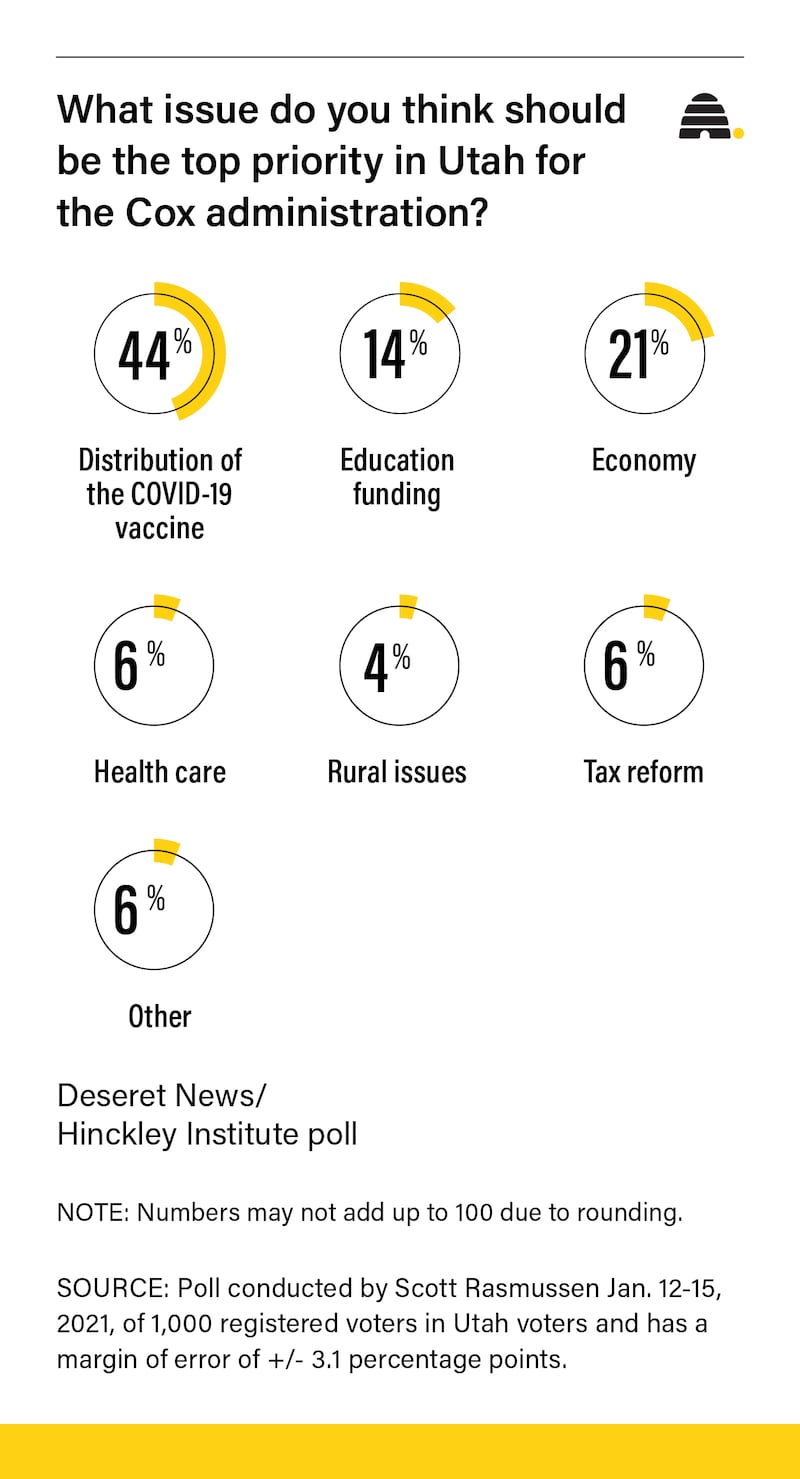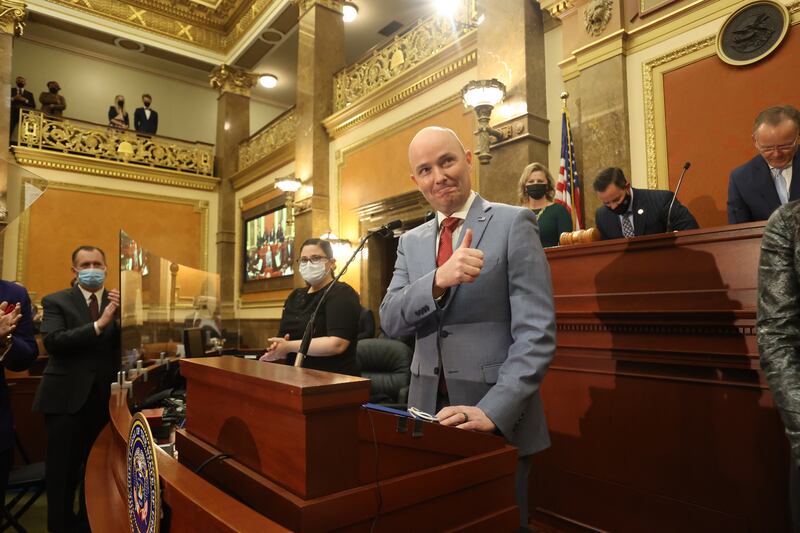SALT LAKE CITY — A majority of Utahns so far approve of Gov. Spencer Cox — but a fair amount still haven’t made up their minds about the state’s new governor.
A new Deseret News/Hinckley Institute of Politics poll found that 55% of Utahns approve of Cox’s performance — including 23% who strongly approve and 32% who somewhat approve — while only 24% say they disapprove. Of those, 14% said they somewhat disapprove and 10% strongly disapprove.

For 20% of Utahns, they’re undecided about Cox, who is headed into his fourth week in office.
Florida-based pollster Scott Rasmussen conducted the survey of 1,000 registered Utah voters on Jan. 12-15, the second week of Cox’s administration. The poll has a margin of error of plus or minus 3.1 percentage points.
Even though Cox has been a familiar face to state government as his predecessor Gov. Gary Herbert’s lieutenant, it’s no surprise that some Utahns still haven’t made up their minds about him as they wait to see how he’ll lead the state through a dark and difficult time amid the COVID-19 pandemic, political pundits say.
“Having 55% approval rating out of the gate is something he should feel happy about,” said Jason Perry, director of the University of Utah’s Hinckley Institute. While the 20% of undecided Utahns wait to get to know him as their governor, Perry also pointed out the 24% disapproval rate is “very low.”
Chris Karpowitz, co-director of BYU’s Center for the Study of Elections and Democracy, agreed that Cox’s approval rating isn’t “terribly unusual for a new governor who is at the beginning of his term of office,” and his low disapproval rate is more noteworthy at this point.
“The set of people who are actively disapproving or rejecting the governor’s leadership at this early stage is pretty small, so that’s important,” Karpowitz said.
For those undecided Utahns, “I think we’ll know more once we see how the legislative session goes and what’s accomplished during that session — and what happens in terms of the pandemic in the next several months,” he said.
Even though anti-mask mandate protesters lined the street up to Cox’s inauguration ceremony near St. George — and earlier this year protesters even showed up outside of Cox’s house in Fairview — Perry and Karpowitz said the poll shows it’s clear that while those protesters are loud, they don’t represent how most Utahns feel.
“They clearly are in the minority,” Perry said. “In the Republican Party, there is still broad support for Gov. Cox.”
The poll showed Republicans especially have favorable opinions of Cox, even though many of those who have protested against him are conservatives. Among Republicans, 32% say they strongly approve of him and 30% said they somewhat approve. Only 8% of Republicans say they strongly disapprove of Cox, while 12% say they somewhat disapprove. About 18% said they weren’t sure.
Cox’s complicated feelings about former President Donald Trump — a critic of him in 2016, then acknowledging last year he would vote for him even though he didn’t agree with Trump’s divisive style — could influence some of Trump’s most ardent Utah supporters’ views of Cox, Karpowitz said, but likely not in any significant way.
“Numerous data points show there is a group of very vocal Trump supporters, but that is not the majority of Republicans within the state of Utah,” Karpowitz said. “It simply isn’t. And so how he and the Legislature deal with the strong Trump wing of the party is an important question going forward, but the group isn’t big enough to fundamentally derail his governorship, at least at this point.”
Even among Democrats, Cox has fair approval rates. About 36% of Democrats said they somewhat approve of him, while 11% said they strongly approve. About 20% said they somewhat disapprove, 11% said they strongly disapprove, and 22% said they aren’t sure.
Heading into his first term, most Utahns believe the COVID-19 vaccine distribution should be the top priority for Cox’s administration, according to the poll.

About 44% of Utahns said Cox should focus on vaccine distribution as his top priority. Next came the economy, with 21%, education funding with 14%, health care and tax reform tied at 6%, and rural issues came in last with 4%. About 6% responded “other.”
It’s no surprise that the two issues of vaccine distribution and economy, Perry said, are “top of mind” for Utahns.
“They are also inseparable,” he said. “As long as COVID-19 is hanging over the heads of our elected officials, our economy is going to be impacted.”
Cox’s actions so far align well with Utahns’ appetite for vaccine distribution, Perry added.
“We’ve already seen him pushing this effort across the state through local departments of health,” Perry said. “We know this is top of mind for him.”
Cox, in a prepared statement issued this week, did not address his approval ratings, but said the poll reflects shared priorities with Utahns.
“The survey shows that our priorities align with those of Utahns, and we are working very hard to return the state to health, prosperity and opportunity for all,” Cox said.
The new governor took office at a “moment of a public health crisis,” Karpowitz said, so it’s no surprise that most Utahns are concerned about “a competent and smooth distribution of the vaccine to as many Utahns as possible and as quickly as possible.”
Cox has already seen some bumps in the road for vaccine distribution. When the vaccine first became available to Utahns over the age of 70 last week, tens of thousands of Salt Lake County residents trying to book an appointment crashed the county health district’s website. Other health departments have had similar problems. But Cox has said his team is working hard to make sure local health departments have the resources they need to address issues swiftly.
It also no surprise that rural issues — even though Cox along the campaign trail had a big focus on making promises to rural Utah — trailed other issues in the poll, since the majority of Utah’s population lives along the Wasatch Front.
“Even though this has not risen to the top of what people are concerned about, it is a significant issue for Utah,” Perry said, adding that as the debate around President Joe Biden’s administration and national monuments heats up “it’s going to be even more significant over the coming days and weeks.”
Because a majority of his constituents don’t necessarily think rural issues are a priority, rural investment and job opportunities are still promises Cox has made, and it’s an issue he may have to grapple with throughout his administration, Karpowitz said.
“That will constantly be a balance that he’ll have to strike,” he said. “Gov. Cox and any political leader can’t be seen as only caring about one small slice of their constituency. That’s a recipe for a problem down the road.”
Perry said balancing Wasatch Front and rural Utah needs is something Cox is already doing.
“He will find that balance, I am sure, as others have,” Perry said. “It really is making sure both of these issues, when it comes to rural issues and urban issues, both find their place, and I think he’s finding that balance now.”



